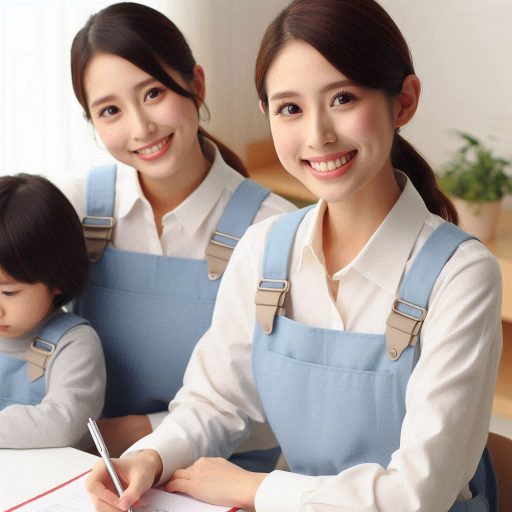Introduction
Childcare workers play a crucial role in the development and well-being of children in the US.
As caretakers, educators, and role models, these professionals provide a safe and nurturing environment for children to grow and thrive.
Importance of Childcare Workers in the US
Childcare workers help support working families by caring for children during the day.
They offer a structured environment where children can learn, play, and socialize with their peers.
This allows parents to focus on their work knowing that their children are in good hands.
Increasing Demand for Qualified Childcare Professionals
With the rising number of dual-income households and single parents working, there is a growing demand for qualified childcare professionals in the US.
This trend emphasizes the importance of having well-trained and skilled individuals to provide quality care for children.
Key Responsibilities that Childcare Workers Have in Their Roles
Childcare workers ensure a safe environment for children.
They create age-appropriate activities to promote development.
They closely monitor children‘s behavior throughout the day.
Also, they also offer emotional support when children need it most.
They also collaborate with parents to ensure continuity in care and communicate children’s progress and needs effectively.
Providing a Safe and Nurturing Environment
Ensuring the physical safety of children in their care
One of the key responsibilities of a childcare worker in the US is to provide a safe and nurturing environment for the children under their supervision.
This includes ensuring the physical safety of the children by regularly inspecting the play areas, toys, and equipment to minimize any potential hazards.
Childcare workers must also be vigilant in supervising children at all times to prevent accidents or injuries.
Creating a warm and welcoming atmosphere for children to thrive
Additionally, creating a warm and welcoming atmosphere is essential for the emotional well-being of children.
Childcare workers should strive to make children feel comfortable and secure in their environment, fostering a sense of trust and belonging.
This can be achieved through positive interactions, encouraging words, and supportive gestures that help children feel valued and respected.
Implementing safety protocols and emergency procedures
Implementing safety protocols and emergency procedures is crucial in maintaining a secure environment for children.
Childcare workers must be trained to respond effectively in case of emergencies such as minor accidents, illnesses, or natural disasters.
Transform Your Career Today
Unlock a personalized career strategy that drives real results. Get tailored advice and a roadmap designed just for you.
Start NowHaving clear communication channels and designated evacuation plans can help ensure a quick and coordinated response to any unforeseen situations.
Read: Pet Grooming Insurance: What You Need to Know
Supporting Child Development
Childcare workers play a crucial role in supporting the development of children in their care.
They are responsible for creating a nurturing and stimulating environment where children can grow and thrive.
Here are some key responsibilities of childcare workers in supporting child development:
Planning and Implementing Age-Appropriate Activities
Childcare workers are tasked with planning and implementing activities that are suitable for the age and developmental stage of the children in their care.
These activities can include structured play, arts and crafts, music and movement, outdoor play, and educational games.
By providing a range of age-appropriate activities, childcare workers help children develop their physical, cognitive, social, and emotional skills.
Observing and Documenting Children’s Progress and Behavior
One of the critical responsibilities of childcare workers is to observe and document the progress and behavior of the children in their care.
By closely monitoring how children interact with their environment and peers, childcare workers can identify areas where a child may need additional support or intervention.
Documenting children’s progress also helps track their development over time and communicate this information to parents and other professionals.
Collaborating with Parents and Other Professionals
Childcare workers play a vital role in collaborating with parents and other professionals to support the holistic development of children.
By communicating regularly with parents, childcare workers can gain insights into a child’s home life, interests, and any specific needs or concerns.
This collaboration allows childcare workers to create a cohesive approach to supporting a child’s development across different environments.
Additionally, childcare workers may work closely with therapists, educators, and other professionals to ensure that children receive comprehensive support that meets their individual needs.
In essence, supporting child development is a multifaceted responsibility that requires childcare workers to be proactive, observant, and collaborative.
Childcare workers plan and implement age-appropriate activities for children.
They observe and document each child’s progress and behavior.
By collaborating with parents and professionals, they ensure effective communication.
They create nurturing environments that foster children’s growth and development.
Transform Your Career Today
Unlock a personalized career strategy that drives real results. Get tailored advice and a roadmap designed just for you.
Start NowRead: Mobile Pet Grooming: Pros, Cons, and Setup Tips
Maintaining Cleanliness and Organization
Childcare workers in the US have a crucial responsibility of maintaining cleanliness and organization in the childcare facility.
This not only ensures the health and safety of the children but also promotes a conducive environment for learning and growth.
Keeping play areas, restrooms, and equipment sanitized
One of the key responsibilities in this area is keeping play areas, restrooms, and equipment sanitized.
This involves regular cleaning and disinfecting of toys, surfaces, and facilities to prevent the spread of germs and illnesses among children.
It is essential to follow proper hygiene protocols and health guidelines to create a clean and healthy environment for the children.
Organizing materials and resources for easy access
In addition to sanitizing, childcare workers are also tasked with organizing materials and resources for easy access.
By arranging toys, books, art supplies, and other educational materials in an orderly manner, children can easily find and use them during their activities.
This promotes independence and fosters a sense of responsibility in the children.
Teaching children about personal hygiene and cleanliness habits
Furthermore, childcare workers play a vital role in teaching children about personal hygiene and cleanliness habits.
They educate children on the importance of washing hands, brushing teeth, and taking care of their personal hygiene.
By instilling these habits early on, childcare workers contribute to the overall well-being and development of the children under their care.
Overall, maintaining cleanliness and organization is a fundamental aspect of a childcare worker’s role.
Childcare workers prioritize hygiene to maintain a safe environment.
They keep spaces organized to ensure health and safety.
Workers also teach cleanliness habits to the children.
These efforts foster a nurturing atmosphere for children‘s growth.
As a result, children thrive and reach their full potential.
Communicating Effectively
Providing regular updates to parents on their child’s progress and activities
Effective communication is an essential aspect of a childcare worker’s role in the US.
It involves keeping parents informed about their child’s development, activities, and any significant milestones.
Transform Your Career Today
Unlock a personalized career strategy that drives real results. Get tailored advice and a roadmap designed just for you.
Start NowBy providing regular updates, parents can feel more involved in their child’s daily experiences at the childcare center.
Collaborating with coworkers to ensure consistency in care
Collaboration with coworkers is crucial to maintain a cohesive approach to childcare.
Working together ensures that all children receive consistent care and assistance throughout the day.
By communicating with colleagues, childcare workers can share important information, discuss strategies, and provide support to one another.
Addressing any concerns or issues promptly and professionally
Addressing concerns or issues promptly and professionally is a key responsibility of childcare workers.
Whether it’s a behavioral problem, a developmental issue, or a parent’s request, responding in a timely and professional manner is essential.
By actively listening, showing empathy, and seeking solutions, childcare workers can effectively resolve any issues that arise.
In fact, effective communication is vital for a childcare worker to succeed in providing quality care to children in the US.
Childcare workers keep parents informed and collaborate with coworkers.
They promptly address concerns to create a nurturing environment.
This support helps children thrive in their care.
Read: Fitness Instructor Job Outlook and Future Trends

Fostering Positive Relationships
One of the key responsibilities of a childcare worker in the US is fostering positive relationships with children and families.
This includes:
Building Trust and Rapport
Childcare workers play a crucial role in building trust and rapport with the children in their care.
By being consistent, responsive, and caring, they can create a secure attachment with each child.
Resolving Conflicts
Conflict resolution is an important skill for childcare workers to possess.
They must mediate disputes between children in a fair and respectful manner, teaching them positive ways to communicate and problem-solve.
Promoting Positive Social Interactions
Childcare workers facilitate social interactions among children, encouraging teamwork, empathy, and cooperation.
By organizing group activities and promoting inclusivity, they help children develop essential social skills.
Transform Your Career Today
Unlock a personalized career strategy that drives real results. Get tailored advice and a roadmap designed just for you.
Start NowCreating a Supportive Environment
Childcare workers strive to create a supportive and inclusive environment where all children feel valued and accepted.
They celebrate diversity, promote kindness, and uphold a sense of belonging for every child.
Read: Building Client Relationships as a Fitness Instructor
Implementing Curriculum and Lesson Plans
Childcare workers play a crucial role in the development and growth of young children in the United States.
One of the key responsibilities of a childcare worker is implementing curriculum and lesson plans.
Following Educational Guidelines and Standards
Childcare workers are responsible for ensuring that they follow educational guidelines and standards set by the state.
This includes incorporating age-appropriate activities and learning objectives into their curriculum.
Designing Engaging Activities that Promote Learning and Creativity
Childcare workers need to be creative in designing activities that not only capture the interest of children but also promote learning and creativity.
This can include arts and crafts projects, sensory activities, and group play.
Assessing and Adjusting Curriculum to Meet the Needs of Individual Children
Every child is unique and has different learning styles and needs.
Childcare workers need to assess each child‘s progress and adjust the curriculum accordingly to meet their individual needs.
This may involve providing additional support for children who are struggling or offering enrichment activities for those who are excelling.
By implementing curriculum and lesson plans effectively, childcare workers can create a stimulating and nurturing environment that fosters the cognitive, social, and emotional development of young children.
See Related Content: Career Growth for Office Clerks in Service Sectors
Monitoring Health and Wellness
As a childcare worker in the US, one of the key responsibilities is monitoring the health and wellness of the children under your care.
This involves a range of tasks to ensure the well-being of the children at all times.
Administering Medication and First Aid
In the event of an emergency or if a child requires medication during the day, childcare workers must be prepared to administer it.
This may include providing basic first aid for minor injuries or illnesses that occur while the child is at the facility.
Keeping Records of Health Checks
Childcare workers are tasked with maintaining accurate records of each child’s health and wellness checks.
This includes documenting any illnesses, injuries, medications administered, and any special dietary requirements or allergies that need to be taken into consideration.
Transform Your Career Today
Unlock a personalized career strategy that drives real results. Get tailored advice and a roadmap designed just for you.
Start NowEncouraging Healthy Habits
Promoting healthy eating habits and physical activity is an essential part of a childcare worker’s role.
This can involve planning nutritious meals and snacks for the children, as well as leading activities that encourage movement and exercise throughout the day.
By monitoring the health and wellness of the children in your care, you are helping to create a safe and nurturing environment where they can thrive and grow.
Be proactive in addressing any health concerns and work closely with parents and healthcare providers to ensure the well-being of each child.
Remember, prioritizing the health of the children is a critical aspect of being a childcare worker in the US.
Continuing Professional Development
Childcare workers in the US have a crucial role in shaping the development of young children.
Childcare providers ensure the safety and well-being of children daily.
They also prioritize their own ongoing professional development.
This ensures that they are equipped with the latest knowledge and skills to provide high-quality care and education to children.
Participating in training and workshops to enhance skills and knowledge
One key responsibility of a childcare worker is to actively seek out and participate in training sessions and workshops that will help them enhance their skills and knowledge.
These opportunities can cover a wide range of topics, from child development and behavior management to early childhood education and health and safety protocols.
By taking part in these training opportunities, childcare workers can stay up-to-date on the latest research and best practices in the field.
This allows them to incorporate new ideas and techniques into their daily interactions with children, ultimately improving the quality of care they provide.
Staying informed about best practices in childcare and education
Another important aspect of professional development for childcare workers is staying informed about the best practices in childcare and education.
This involves keeping abreast of current trends, research findings, and regulatory requirements that impact the field of early childhood education.
Childcare workers can stay informed by subscribing to professional journals, attending conferences and seminars, and networking with other professionals in the field.
By staying informed, they can ensure that they are following the most up-to-date guidelines and strategies for providing high-quality care to children.
Seeking feedback and opportunities for growth and improvement
Lastly, childcare workers have a responsibility to seek feedback and opportunities for growth and improvement in their practice.
This can involve soliciting feedback from supervisors, colleagues, and families of the children in their care, as well as engaging in self-reflection and assessment of their own performance.
By actively seeking feedback and taking steps to improve their practice, childcare workers can continually enhance their skills and capabilities.
Transform Your Career Today
Unlock a personalized career strategy that drives real results. Get tailored advice and a roadmap designed just for you.
Start NowThis not only benefits the children in their care but also contributes to their own professional growth and development.
In a nutshell, continuing professional development is a key responsibility of childcare workers in the US.
Childcare workers ensure high-quality care by attending training and workshops.
They stay informed about best practices to improve their skills.
Seeking feedback helps them identify areas for growth.
They consistently look for opportunities to enhance their services.
These efforts guarantee excellent care and education for children.
Conclusion
Childcare workers in the US ensure a safe, nurturing environment.
They foster social and emotional growth in children daily.
They design engaging activities that encourage learning and exploration.
Also, they support children’s development through care, attention, and creative play.
They play a vital role in shaping the future of our society by fostering the well-being and development of young minds.
It is essential that we recognize and appreciate the hard work and dedication of childcare professionals in our communities.
By supporting and respecting childcare workers, we are investing in the future success of our children and the overall well-being of our society.




